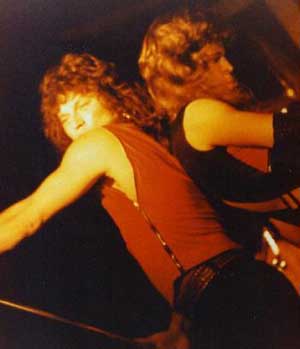|
FIB MUSIC: What was the band?
Paul: The band was called Legend....we were just doing five nights a week. I had a lot
of money in my pocket then. Also, during that time, the Dio's asked me to move in their home, so I did that. When they first
signed Rough Cutt, they pulled me in there...they were afraid I would go with someone else. So, I lived with them for awhile and
then we got signed and went to Europe, got signed and came home. We went to find a producer and found Tom Allom and went in and recorded
the first Rought Cutt album.
FIB MUSIC: That's what I thought. You guys were touring a lot before you even got signed, right?
Paul: Oh yeah. We were doing all kinds of things before we got signed. We went
to Europe to see if we could get a European deal and came to the States and they finally signed us, which was unbelievable. At that
time, everybody in the L.A. scene was getting signed and then we got signed before a lot of people, but it took them ages
to find us a producer that we all agreed on, so we missed the window. The Ratt window, the Dokken window....all those doors
that were open for the 80's bands, by the time we released the album Tipper Gore had gone over the top with the censoring and put
all those stickers on the records. We would go to these radio stations and they hadn't even opened up our record.
FIB MUSIC: Since you were there to see the L.A. music scene in the 70's and then in the 80's, how did you
see the music scene change?
Paul: Oh, it changed big time. People have to pay to play in those clubs.
FIB MUSIC: Bands weren't paying to play when Rough Cutt was on the scene, right?
Paul: No, but they do now.
FIB MUSIC: Didn't they start doing that at the end of the 80's?
Paul: Yeah.
FIB MUSIC: So, what was the difference between the 70's L.A. scene and the 80's scene?
Paul: I was a place where music was born. Everybody came to L.A. to make it. You've got
the industry there, but as far as the entertainment goes, at that time, everybody was flocking to L.A. in the late 70's, early 80's. The
club scene was booming then, but it is not now.
FIB MUSIC: Well, it wouldn't be right not to ask about this. Somewhere around this time period you
play Duke Fame in This is Spinal Tap. How did that come about?
Paul: Well, what happened was Jake was in the band when it all came about. We
played the Troubadour, took an ad out in the paper and the people in charge of casting for the movie saw the ad and
came down the show and asked the three of us, Jake, me and Dave Alford to come down and audition for the part and I showed
up in white leather and I was the first one there, so I got the gig. That's how I got the gig, I didn't really have to
try hard, just the first guy who showed up. I got my SAG card out of it, so it was cool.
FIB MUSIC: Any memories come to mind from the filming?
Paul: Well, there was one thing....I always tell the story of when we......we weren't
signed yet, so I wasn't really a rock star and the girl who was playing my girlfriend was a girl who had been dating
Jackson Browne, just before he met Daryl Hannah....so that was my arm candy in the film and of course Wendy Dio was managing me
who was married to Ronnie, who was a rock star, so I actually had to act like I was rock star.
FIB MUSIC: Anything else come to mind?
Paul: Well, one thing.....I kept looking at the guys in
Spinal Tap and thinking their hair looked really weird...I didn't know they were wigs, at the time. So, I'm sitting next
to Rob Reiner at lunch and Michael Mckean,Christopher Guest and Harry Shearer are all sitting there as well and they all have
their hair off and I said, "you know, you guys look just like the guys in Spinal Tap" and they all started laughing at me,
"we are dude, they're just wigs". Ahhhh, that's why they looked so weird.
FIB MUSIC: The movie pissed off several rock stars. I think Steven Tyler even walked out of the movie because
he thought it was about him.
Paul: Oh really, I didn't know that. I tell you, that thing has followed me around.
Anytime a gig is weird, it's Spinal Tap. But you know, everything in that movie was true. Everything that happened in that movie,
happened to Rough Cutt somewhere down the line. We were doing a show and I was at the front of the line ready to
get on stage and I've got to take a dump. So, I've got to walk past everybody and have a guy in a cart take me back to a
toilet backstage.....and then there was a gig we played where we couldn't find the stage....just like Spinal Tap. So, people
can walk out being pissed off, but I'm sure it really hit a nerve. Everybody has had Spinal Tap moments happen to them. Aerosmith, I'm
sure had many moments....when Tyler popped Hamilton, or Hamilton popped Tyler and knocked him off the stage.
FIB MUSIC: They got in a fight on stage?
Paul: Yeah, they got in a fight on stage. He fucking cold-cocked him and knocked
him off.
FIB MUSIC: I'm pretty sure it was Tyler who was pissed off because it was also during the time when Aerosmith
were on their way down, right?
Paul: Yeah, it was....it really was...it was when Jimmy Crespo was in
the band.
FIB MUSIC: Didn't you play with him?
Paul: Crespo? He's a nut. He's a boy in the bubble. He's allergic to everything. When
he recorded with Aerosmith, everyone was staying at Tyler's house and he was in a Motel 6 because he is allergic to everything. We worked
together for awhile and it was just so hard to work with someone who was just so allergic to so many things. We did a video and we
had fog in the video and he said, "I can't do that anymore; I can't do anymore filming." We did a gig in
San Diego, as Rough
Cutt, picked him up in Culver City, which is about a two hour drive to
San Diego. J.T. Garrett, who was playing keyboards for
us, at the time....., so he picks up Jimmy and Jimmy gets in the car. It's about 100 degrees, maybe in the 90's...he gets in the
car with a sweater, t-shirt and a leather coat on and looks at J.T. and says, "can you turn the air off, I'm cold". So, they
had to drive to San Diego in bumper to bumper traffic with no air. J.T. would give up anything for air, he thinks it's the
best thing ever invented. After that gig, we had a gig in Las Vegas and we decided that we would fly Crespo. We could all
drive out there and we would just fly Crespo in, so we could have air conditioning again. So, we picked him up at the
airport and the first thing I ask is, "Jimmy, how was your flight?" and he says, "ohhhhh, it was terrible". He never had
a good thing to say about anything. It just got to the point where it was just whatever. We were in the middle of recording
an album and he and his wife and family just got up and moved to Vegas in the middle of it.....right in the middle of the
project. Howard Leese had to cut on the songs that Jimmy had co-written with me.
FIB MUSIC: He just leaves the project without saying anything?
Paul: Yeah. Trippy.....trippy people....to me he's a weirdo. I don't really know him....
I shouldn't say that. Everybody has their quirks and he has his. For whatever reason he acts like that is beyond me.
FIB MUSIC: What was it like working with Mitch Perry?
Paul: Well, he is an incredibly talented guitar player....., as brilliant as they come. He just
has some problems with drinking. I don't know if the substance is gone in his life, but I had to quit playing with him
because.....I'm not a drinker and I take stuff a little too serious.
FIB MUSIC: You haven't had anything to drink since the seventies, right?
Paul: Yeah.
FIB MUSIC: That's amazing. You didn't party all through the Rough Cutt days?
Paul: Oh, yeah, yeah, yeah I did, but when I met my wife 17 years ago, she just cleaned
my ass up. I've been really pretty clean of anything and everything.
FIB MUSIC: You just didn't like to drink?
Paul: I've never been a real drinker, but when I did, I just turned into a real
asshole. So, I just tried to stay away from it. I have a little beer, a little wine, but I don't drink too much.
FIB MUSIC: What was your drug of choice?
Paul: I've always been a pothead. I'd rather smoke a joint than drink Jack
Daniels. I won't be the one druelling in a corner.
FIB MUSIC: Smoking weed doesn't mess with your throat?
Paul: No and I don't have to smoke too much, just one or two hits and I'm fine. I find
that I do it less and less now. I'm finding out now, why so many engineers don't get high at work. You have to remember what
you are doing.
FIB MUSIC: Do you remember anything from the day you signed your record contract with Warner Brothers?
Paul: I remember we had champagne. I remember being in Wendy Dio's office and we
got the call, the paperwork and it was all about finding the studio and the right producer.
FIB MUSIC: Anything stand out from the recording sessions for the self-titled release?
Paul: Nothing really. They spent a lot of time on the guitar tracks. I had to
cut my parts in ten days.
FIB MUSIC: Basically a song a day.
Paul: Yeah. Then the first gig we did after the record was done was at the Forum, with
Dio headlining, we warmed up for Dokken. We just did a few dates with them and then went out on the road with
Krokus and Accept, that was our first tour.
FIB MUSIC: What was that like?
Paul: Well, we didn't get a soundcheck at first, but it just so
happened that Spinal Tap was showing at the time we were on tour with Krokus and Accept. The guys in Krokus
saw it and asked if I was Duke Fame and I said yes and Marc Storace asked me to come backstage because he wanted to
meet me. From then on, we got a soundcheck. Duke Fame came in handy a few times.
FIB MUSIC: Where did you record the self-titled release?
Paul: We recorded it at the Record Plant, in L.A., on Third Street, before they
moved it.
FIB MUSIC: How long does it take to record the record?
Paul: It took about three months, we went thirty grand over budget.
FIB MUSIC: Do you remember what the budget was?
Paul: I think it was about a quarter of a million dollars. Part of that session was
supposed to be recorded at my parents' recording studio, but Tom Allom was getting too much nose candy from Rose at the Record
Plant, so he wanted to stay there. He had a big nose problem.
|
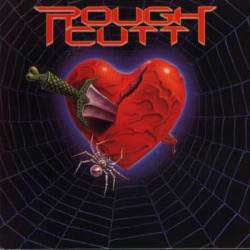
Rough Cutt
Self-titled
|
FIB MUSIC: Were you planning on recording your vocals at your parents' studio?
Paul: Yeah. We were going to cut the basic tracks at the Record Plant and all the
guitars and vocals were supposed to be done at my parents' studio and then they burn my folks.....and then we went thirty grand over
budget.
FIB MUSIC: What did Tom Allom get for doing the record?
Paul: He got fifty grand up front.
FIB MUSIC: Plus points on the record?
Paul: Yeah, they're the only people who ever made any money off the record.
FIB MUSIC: How long did it take from the time you signed the record contract, to the time you released
the record?
Paul: About a year. Producers, producers, producers.
FIB MUSIC: Just trying to find one?
Paul: Yeah, finding someone who had the available time and someone the record
company would ok. Not to mention that the band was arguing over producers and it just took forever. We blew the window.
FIB MUSIC: How did you feel about the finished product?
Paul: It was alright. I don't think anything I have ever done, except for the
record I did with Jeff Northrup, "Back on Track" and a little of the Quiet Riot record that I did ever really captured what
I am, as a singer. What my roots are; I'm really more of a bluesy kind of singer. I just kind of jumped in on the
heavy metal scene because there was a door opening with the Dio's, but I'm really an R&B singer more than anything. I think the
thing I am doing with Pete Reveen is the closest to what I'm about. I think the real Paul and the real Pete Reveen are going
to come out on this record. We're more into the late seventies heavy rock, which was a really good time period. Not saying that
there wasn't some great music in the eighties, there was some really great stuff. It was the later years with Poison, which they
have done well with what they do, but to me, that stuff is bubble gum.
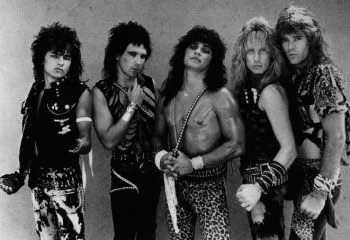
FIB MUSIC: Who else did you guys tour with to support the self-titled release?
Paul: We toured with Accept and Krokus and then Accept broke away from
Krokus and we went on tour with Accept. We did some festivals.
FIB MUSIC: How long was the tour?
Paul: Probably for seven to eight months and came home and started another record.
FIB MUSIC: How do you guys end up working with Jack Douglas on your next record, "Rough Cutt Wants You"?
Paul: Well, we met Neil Kernon, who had, at the time, just done Dokken's "Under Lock
& Key", which had gone platinum. He had been the producer and Michael Wagener engineered it. However, the guys in the band
did not think Neil would do a great job for us because Michael Wagener was the engineer. But Neil was an engineer, songwriter and
producer. He told the band that you guys should be writing material sort of like Bryan Adams with the type of singer
you have and the guys did not dig that idea. We sat around and listened to the Dokken album before it came out and I
just thought, we've got to get this guy because he was a songwriter too. We hung out with him all day, went down to
the Village in New York and hung out.......to make a long story endless, we didn't choose him; we chose Jack Douglas. Then
we go to find out, the next album Neil does is Queensryche and it gets a grammy. Anybody I ever wanted, I always got outvoted. We
were on this democratic process with the band, which is the worse thing you could do with a band. Giving too many people too
much say. It's better to have one person making the decisions. When you have too many people making decisions, it takes too
long to make a decision. That had a lot to do with it.....never getting our records out on time because everybody was to
busy trying to decide, not just the band, the record company would come in say what they had to say. It's crazy.
FIB MUSIC: Jack Douglas was just available?
Paul: No, they wanted to use him because he had done all the Aerosmith stuff. He
showed up and he looked like he had just gotten out of a mental institution....., but it was all good. Jack was really fun to
work with.
FIB MUSIC: How so?
Paul: Well, in "Rock in the USA", I went into track my vocals and Jack said, "I want
to sing it a little different. I want you to go home tonight and rewrite your lyrics", he gets in front of the mic and starts
doing this jazzy melody. So I went home and rewrote it to fit the melody. Originally, I had done it way different, all
ligato, kind of heavy metal, straight ahead and he added the jazz thing, which was a (Steven) Tyler thing.
FIB MUSIC: Did Jack Douglas share any good stories?
Paul: His wife had gotten thrown into Rehab, or a mental instituion. Jack was
with John Lennon the night he was shot. They had been working in the studio and Jack dropped him off at the Dakota. After that,
Yoko was trying to get money out of Jack, that they had given him. They were flying back and forth from Los Angeles to
New York in private jets, seeing how much coke they could do. Just before we met him, he went into the nut house to get
his girlfriend. He went in, put on the green intern outfit, put here in a wheelchair and wheeled her out. He told me that
story when I met him. I was thinking, what in the hell do we have here. He was a nice guy to work with.
FIB MUSIC: Where did you record "Wants You"?
Paul: We recorded some of it at Cherokee Studios and also Crystal Studios and, once again,
we were supposed to do part of it at my folks studio and they got burned again. We mixed the record in New York at the Record Plant and
master it there and I had to fly there to finish my vocals because we weren't finished with the vocals.
FIB MUSIC: Did you have a smaller recording budget on this record?
Paul: It was about the same as the last one.....about $225,000 to $300,000.
FIB MUSIC: If my memory serves correct, it seems like this album didn't get as big of a push as the first one.
Paul: Yeah, we didn't get a push at all. We lost everybody. As soon as the first
album came out, we lost our A&R guy to Capitol Records. You depend so much on an A&R guy and when you lose him, you don't even
realize how much you've lost. We lost our voice at the label and they didn't know what to do with us. He fought for us
tooth & nail and when he left we were just another band in the shuffle. We were on great tours, he had us going all the time. They
just didn't really believe in the band. When your labelmates are Van Halen, Madonna and ZZ Top, who was huge back then..., it's
easy to get lost in the shuffle.
FIB MUSIC: How long are you guys in the studio?
Paul: About the same as last time, about three months and then I had to
fly to New York to finish the vocals, which was cool with me because I got to go to New York. It should have been
done in California. My family had blocked out time for us and then they got burned.
FIB MUSIC: Did your parents have a nice studio?
Paul: We had a very nice studio, it was top of the line. The just didn't
like the board, it was a Trident board. It was a great board, just a preference. If you started at the Record Plant, most
likely you wouldn't leave. Back then, it was who signed the band and where we made the record was most important. We could
have made a record in a bedroom for all I cared. If it sounded good, who gives a shit what we spent on it, but going over
budget......I'm just watching money be pissed away. Here's my career going down the tube because they are just pissing money
away.
FIB MUSIC: At least you were thinking about that. Most of the people I interview
never really thought
about it, at the time.
Paul: No, I was watching them just waste money.
FIB MUSIC: You knew you had to pay it back.
Paul: Exactly, we're not going to see a penny of this until it recoups.
FIB MUSIC: Speaking of....did you guys ever recoup?
Paul: Oh yeah, the first album did, that one recouped, but our manager signed
a deal that we wouldn't get any money for the first record, until the second record recouped. So, when they go out of print, how
do they ever recoup, they can't.
FIB MUSIC: What's weird is the first two Rough Cutt releases went for huge money on Ebay, for years.
Paul: They've re-released them on cd....a guy from Wounded Bird released them.
FIB MUSIC: Right.....the Rough Cutt, two on one cd?
Paul: Yeah.
FIB MUSIC: Do you see any money from that?
Paul: No, we won't see a penny of that until Warner Brothers recoups that
second album.
FIB MUSIC: What's the debt?
Paul: Well, probably now it's around 35 to 40 thousand. It's not bad, but if it's
not in print and it's not in stores, it's not being sold. This guy is selling them on the internet, who knows where else
he has them available.
FIB MUSIC: Why isn't the Quiet Riot record you did still in print?
Paul: I don't know, but I'm thinking about licensing it and releasing it. What's really
neat is everytime Quiet Riot released a Greatest Hits, Sony would include three songs that I did with the band. I'm still getting
royalties from albums that never made it to cd. I'm sure Kevin hated it.
FIB MUSIC: Some of the songs you did with the band were the best. I used to love....what was the hit song you did
with them?
Paul: "Stay with me Tonight"?
FIB MUSIC: Yes, I loved that song when I was a kid.
Paul: That song was supposed to go on the second Rough Cutt record. I even gave the
guys in Quiet Riot equal writing credits on it. It didn't make the Rough Cutt album. It didn't have the same feel as what went
on the Quiet Riot record. It didn't have that bap bap, that echo on the snare vibe and it didn't make the cut. I had written
the song, so I let the guys in Quiet Riot hear it and they wanted to do it. But on that record, the guys in Quiet Riot got
an equal share of the writing and the publishing.
FIB MUSIC: That's amazing, Spencer Proffer actually let you keep the publishing?
Paul: Well, that's a whole other story. When I left Rough Cutt, it was really
weird because Rough Cutt was in Japan and we were right behind Quiet Riot on tour. They were just a week ahead of us. They
fired Kevin in Japan and I quit Rough Cutt in Japan.
FIB MUSIC: Was it the end of the tour?
Paul: It was at the end. We were having problems and then Wendy said she had
heard that Quiet Riot was looking for a lead singer and I said, "well, I'm going to check it out".
If you found this interview first, make sure to read
Paul Shortino Part I - Current Shortino News &
Paul Shortino Part III - The Quiet Riot Days
Don't forget to visit Paul's websites:
Offical Paul Shortino Website
Paul Shortino's The Cutt
The Official Paul Shortino MySpace Page
Search Fibits for Paul Shortino items
Videos:
Paul Shortino Video Search on YouTube
|

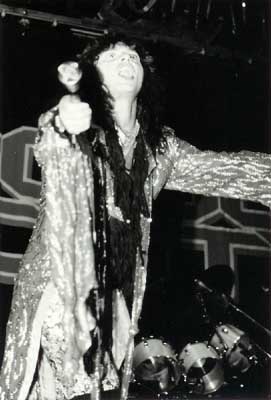
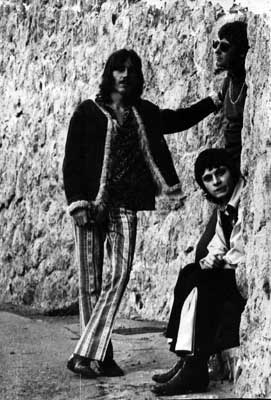
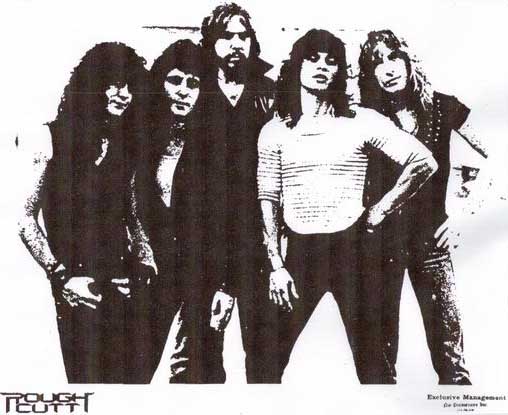 Rough Cutt
Rough Cutt